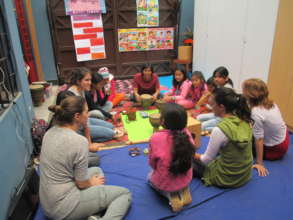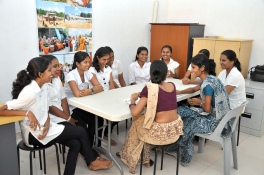As a followup to our June 21 post on Buddhist Global Relief’s new programs, we are pleased to announce new support to communities in Sri Lanka and Vietnam:
Tam Binh Red Cross (hospital feeding)
For the fourth consecutive year, BGR continues to support Vietnam’s Tam Binh Red Cross’ program to help the poor feed family members who are hospitalized. Located in the Tam Binh district in the Mekong Delta region, a single hospital exists to serve more than half a million people. The price of a hospital stay does not include food, and poverty-stricken families who must carry the heavy weight of medical and hospital costs are further burdened by the need to buy food for their ill family members. BGR’s funding will allow the Red Cross to purchase in-season vegetables, tofu and charcoal for cooking for these patients. These funds are leveraged with the volunteer labor of more than 80 volunteers, who prepare the meals and serve lunch and dinner to the most vulnerable ill and poor people.
Tam Binh Red Cross (Scholarships)
BGR continues to support the scholarship program of the Tam Binh Red Cross with a third year of funding. Entrenched rural poverty in Vietnam has forced many families to make the difficult decision to keep their children at home to work in the fields rather than send them to schools where they cannot afford the basic fees. BGR funds will provide the annual enrollment fee, educational materials and basic health care for 150 students, enabling them to overcome the barriers of poverty and to continue their studies. 100% of BGR’s funds will be used for these scholarships, without any deduction for administrative costs. To qualify for these scholarships, each student must meet criteria for low income, high teacher recommendations, and good conduct. By providing educational opportunities to these promising students, BGR hopes to break the cycle of poverty in their families.
Sarvodaya (Kelwatte water supply)
This year, BGR is supporting its long-time partner, Sarvodaya (“Welfare of All”) USA with a life-saving project to provide reliable clean water supplies in the Kelwatte district of Sri Lanka. Currently, these residents obtain untreated water from an open and polluted stream. An assessment of the needs of these villagers showed a high rate of childhood disease from drinking unsafe water. Dry seasons threaten water shortages every year, putting crops, livelihoods and health at risk. BGR funds will help provide safe and clean water to hundreds of residents with a new gravity water supply system. The local community participates in the construction by providing direct labor through shramadana: “sharing work, knowledge, talents and time.” This project will empower the community, raise individual and self-esteem and be a model project for neighboring communities. Thus, the project will provide a foundation for personal and social awakening and offer the gifts of water and health.
In making these grants, BGR addresses the twin problem of pollution and poverty, helps ill and vulnerable members of poor families, and acknowledges the critical role of education in escaping intergenerational poverty and hunger.











 CENWOR
CENWOR